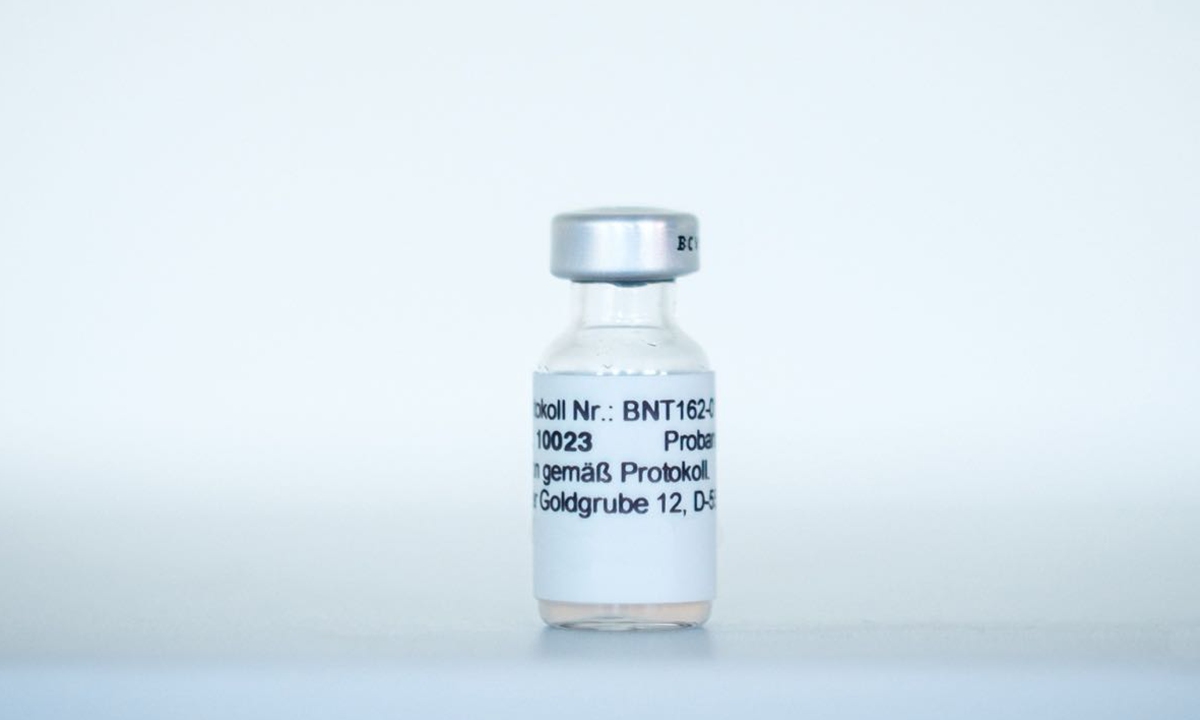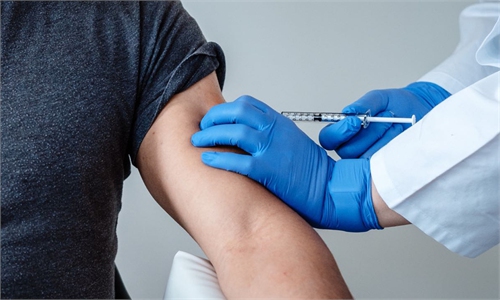Shanghai-based Fosun to provide Taiwan region with 10m COVID-19 vaccines
No interference from mainland in 10m vaccine purchase deal to Taiwan: Terry Gou

The COVID19 vaccine BNT162b2 co-developed by Fosun Pharma and BioNTech Photo: Courtesy of BioNTech
Shanghai-based Fosun Pharma has signed a deal with Taiwan-based Foxconn, Taiwan Semiconductor Manufacturing Co (TSMC) and a medical firm to sell 10 million COVID-19 mRNA vaccine shots to Taiwan to help fight against the resurgence of COVID-19 in the island of Taiwan, the Global Times learnt from Fosun Pharma on Sunday.
The vaccines will be donated to Taiwan's medical institutions by Hon Hai Precision Industry Co (known as Foxconn whose founder is Terry Gou), TSMC and Zuellig Pharma for public mass vaccination.
"The mainland did not meddle or interfere in the vaccine procurement process, and we thank it for allowing the procurement to be conducted through commercial negotiations," Terry Gou said at his Facebook page on Monday.
The signing of the vaccine purchase deal proved that previous rumors of the mainland preventing the island of Taiwan from accessing vaccines are unfounded, a spokesperson for the Taiwan Affairs Office of the State Council suggested on Monday.
The mainland is willing to see the successful signing of the deal, Ma Xiaoguang, the spokesperson said, noting that the mainland had clarified long ago that they would like to support the island of Taiwan on fighting the epidemic, including providing WHO-approved vaccines produced by Sinopharm and Sinovac.
Given that each person requires two shots, the batch can cover about 5 million people, roughly 21 percent of the local population.
The Taiwan-based companies are reportedly acting on behalf of the local authority, which has been widely criticized for its attempts to politicize the vaccine deal by repeatedly rejecting potential vaccines offers from the Chinese mainland.
The deal has faced several obstacles in clinching a contract, but Shanghai-based pharmaceutical giant Fosun Pharma has shown its willingness to provide the island with BioNTech mRNA COVID-19 vaccines more than once.
Fosun has the exclusive rights to sell the BioNTech vaccine to the Chinese mainland, Hong Kong, Taiwan and Macao while Pfizer has agency rights for the rest of the world.
Vaccine shortages have been a serious difficulty in the island amid a new outbreak of domestic cases. The plight of residents rushing to scramble for leftover COVID-19 vaccines in the island of Taiwan, due to scarce doses amid the still-rampant coronavirus outbreak, brought a new round of public lambasting against Tsai Ing-wen's Democratic Progressive Party (DPP) authority for putting political interests above public health protection.
Taiwan has so far used vaccines mainly from British-Swedish firm AstraZeneca and the US-based Moderna. As of Sunday, only 0.3 percent of residents - 60,720 people - were fully vaccinated with two doses.
"We are glad to see that the vaccine co-developed by Fosun Pharma and BioNTech can play a positive role in the prevention and control of the epidemic in Taiwan. We will work closely with our partners to provide safe and effective vaccines to Taiwan at an early date, safeguarding the lives and health of Taiwan compatriots, and helping their life getting back on track as soon as possible," Wu Yifang, Chairman and CEO of Fosun Pharma, said upon the deal.
The successful purchase has met the long-held expectations of the Taiwan public. Without the efforts of influential private companies on both sides to negotiate, the procurement agreement might not have been completed, Wang Jianmin, a senior cross-Straits expert at Minnan Normal University, told the Global Times on Sunday.
"But it comes a bit late, largely because of the Taiwan authority's hesitation and rule-breaking in the whole process. If the authority could respect commercial rules instead of using political power to interfere with the process at the very beginning, perhaps the people in Taiwan could get out of the plight of the epidemic sooner," Wang said.
The difficulties and twists and turns in this deal also precisely reflect a complex power spectrum in Taiwan as media has revealed the pressure of various commercial interests and financial groups who urged the development of locally developed vaccines first for commercial gain, Wang noted.
Ugur Sahin, CEO and co-founder of the Germany-based BioNTech, said that it has always been their goal to provide access to a well-tolerated and effective vaccine for as many people as possible worldwide. The doses are manufactured in Europe, and BioNTech will continue to evaluate the vaccine for use against additional variants of concern, he suggested.


